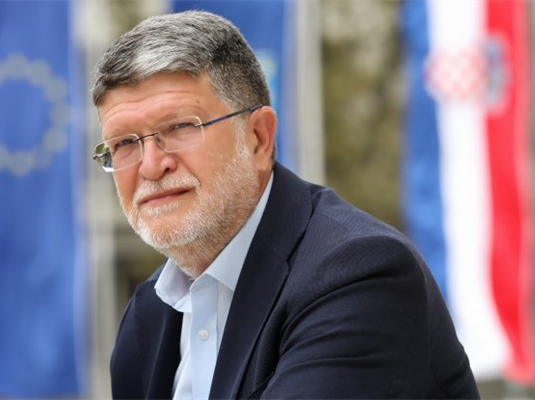The European Parliament, at its plenary session held last week in Strasbourg, adopted Picula's report on US-EU relations, in which he warns that, due to an increasing number of global crises, it is necessary to strengthen the cooperation between the European Union and the United States.
Picula evaluates that the West, for the first time since the Cold War, is facing consolidated forces in the world, as well as internally, that do not share its values.
As a reminder, the report, which was accepted by 485 MEPs, is the second in this term of the Parliament that Picula prepared on relations with the US. "At the end of 2021, the European Parliament adopted my first report on EU-US relations. That was a time when we thought that, after Joe Biden's victory in the US presidential elections and after the world started to emerge from the crisis imposed by COVID, we were facing a time when our (global) cooperation would become better and closer day by day. However, it turned out that this expectation was unrealistic because a few months after adopting my report, the world fell into a great crisis because Putin decided to realize his probably long-imagined plans with an invasion of Ukraine."
"Putin's invasion of Ukraine has, in many ways, consolidated the positions of various authoritarian policies, as well as states that have decided to create a kind of counter-order at the global level," he assesses.
"First of all, I am thinking of Moscow, but also Beijing. Of course, some other states, which consider the West as their opponent, are always happy to join. Mainly, Iran and North Korea, but I also have the feeling that there has been a real competition in what is today called the global south, which has decided, for various reasons, to describe Putin's aggression as a European war. They have not easily politically solidified with the positions of the United States and the European Union, which have sided with Ukraine."
Regarding new alliances and democracies under pressure, "The West has received a kind of consolidated forces that do not share political values with it and have confronted economic interests," evaluates Picula, reminding that "China is currently the main military-commercial partner for almost 130 countries in the world, while the European Union and the United States cannot even come close to that."
"This is one of the reasons why it is necessary to reconsider the current relations of the United States and the European Union, to see if we can defend this strategic interest of strengthening a renewed multilateralism and how to regain, or conquer, some positions in such globally set relations, where the fact that the United States and the European Union make up 46% of the world's gross domestic product, where a lot of innovations, technological or social, still happen.
This engine has not stopped working, but, obviously, it is no longer so attractive and self-evident that it serves as a model in different parts of the world. This Western model is under pressure."
The pressure on Western democracies "comes from this changed environment in which we can no longer talk about multilateralism, but about multipolarity," explains Picula, calling the new global relations "a world of alliances."
"Different countries in the world establish ad hoc alliances to realize their national and regional interests. So, the order that the United States and the European Union have built together for 70 years, in its various forms, is under strong pressure. And another form of pressure that is the motivation for this report is the pressure of those who in our own countries and our alliances no longer take democratic orders as those generations did after World War II, and even after the end of the Cold War."
Regarding disinformation and the super-election year, Picula notes that "political options that are more prone to an authoritarian perception of reality, which do not see themselves as part of some liberal Western tradition with a clear division of powers and freedoms, which have been developed and guaranteed from generation to generation, are becoming more successful precisely in democratically organized elections. So, we see that opponents of democracy come to power democratically. My favorite example is, when you look at the European Union, when you look at the six countries that founded the European Union, in two of them, the far right is in power or will come to power."
Picula also warned that "a significant part of my report is dedicated to a phenomenon that is not new, but is becoming more influential, and that is disinformation. Authoritarian regimes and undemocratic regimes, even dictatorships, have realized that the battle in the digital world does not cost as much as equipping armies, but can yield success if they present their real political goals among Western citizens falsely but convincingly enough."
"For a long time, this phenomenon remained marginal, and now we are slowly becoming aware of it and looking for a way to counter it. Especially ahead of the super-election year, which is such both in the United States and in the European Union. One paradox is that next year elections will be held in 70 countries of the world and that 4 billion and 200 million people will approach the ballot boxes. Now one would say, everything is fine with democracy, so many people vote, but among them is a Russia and many Russia-like countries, which use democracy as a facade, and the result is very well known in advance," concluded Picula.


